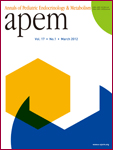
ENDOCRINE RESEARCH
Scope & Guideline
Illuminating the complexities of endocrinology.
Introduction
Aims and Scopes
- Endocrine Disorders and Treatments:
Research related to various endocrine disorders such as thyroid diseases, diabetes, and adrenal conditions, focusing on diagnostics, treatment outcomes, and management strategies. - Metabolic and Cardiovascular Implications:
Studies that investigate the metabolic consequences of hormonal changes and their relationships with cardiovascular health, including obesity, metabolic syndrome, and related diseases. - Molecular and Genetic Insights:
Exploration of the molecular and genetic factors influencing endocrine functions, including gene expression studies, genetic polymorphisms, and biomarkers for endocrine diseases. - Innovative Therapies and Interventions:
Research on novel therapeutic approaches, including pharmacological treatments, lifestyle interventions, and surgical outcomes in managing endocrine disorders. - Cross-disciplinary Research:
Integration of various fields such as immunology, oncology, and reproductive health to provide a comprehensive understanding of endocrine functions and their systemic effects.
Trending and Emerging
- Autoimmune Endocrine Disorders:
An increasing number of studies are focusing on autoimmune conditions such as Hashimoto's thyroiditis, indicating a growing interest in the interplay between immune responses and endocrine functions. - Diabetes and Metabolic Health:
There is a marked trend towards research on diabetes, particularly in relation to its complications, management strategies, and associations with other metabolic disorders. - Impact of COVID-19 on Endocrine Health:
Research examining the effects of COVID-19 on endocrine functions, particularly in patients with pre-existing conditions, has surged, highlighting the pandemic's influence on health research priorities. - Precision Medicine in Endocrinology:
Emerging studies are increasingly exploring precision medicine approaches tailored to individual genetic and metabolic profiles, particularly in diabetes and thyroid disorders. - Role of Inflammation in Endocrine Disorders:
There is a rising focus on the role of inflammatory markers and pathways in the pathogenesis of endocrine disorders, linking metabolic health with immune responses.
Declining or Waning
- Traditional Diagnostic Methods for Thyroid Disorders:
There has been a noticeable decrease in studies solely focused on traditional diagnostic methods for thyroid disorders, as newer, more advanced diagnostic techniques and biomarkers are being developed. - Basic Animal Models of Endocrine Disorders:
Research utilizing basic animal models is becoming less prominent as there is a shift towards more complex models that better mimic human pathophysiology and clinical conditions. - Longitudinal Studies on Hormonal Changes in Aging:
While aging and hormonal changes remain relevant, the frequency of longitudinal studies specifically addressing this topic has diminished, possibly due to a growing emphasis on immediate clinical applications. - Surgical Techniques for Endocrine Disorders:
There appears to be a decline in research focused solely on surgical techniques for endocrine disorders, as the field is increasingly leaning towards less invasive approaches and comprehensive treatment plans. - Historical Perspectives on Endocrine Research:
Research focusing on historical perspectives or retrospective analyses of endocrine conditions is less frequently published, as the journal shifts towards contemporary and forward-looking studies.
Similar Journals

REVIEWS IN ENDOCRINE & METABOLIC DISORDERS
Transforming research into practice for better patient outcomes.REVIEWS IN ENDOCRINE & METABOLIC DISORDERS, published by Springer, is a leading journal in the field of endocrinology, diabetes, and metabolism, with an impressive Q1 ranking in both categories as of 2023. With an ISSN of 1389-9155 and E-ISSN 1573-2606, this journal serves as a vital resource for researchers, clinicians, and students seeking comprehensive reviews that address the latest advancements and interdisciplinary approaches in the management of endocrine and metabolic disorders. Operating from the Netherlands, it features articles that are rigorously peer-reviewed and is notable for its significant impact factor reflected in its Scopus rankings, placing it in the top percentile of its categories. Although it does not currently offer open access, it provides critical insights applicable to both basic and clinical settings, making it indispensable for those dedicated to enhancing patient outcomes in endocrine health.

Revista Portuguesa de Endocrinologia Diabetes e Metabolismo
Elevating standards in endocrinology and diabetes management.Revista Portuguesa de Endocrinologia Diabetes e Metabolismo is a pivotal journal dedicated to advancing the fields of endocrinology, diabetes, and metabolism. Published by the esteemed SOC PORTUGUESA ENDOCRINOLOGIA, DIABETES & METABOLISMO-SPEDM, this journal serves as a platform for the dissemination of high-quality research, clinical studies, and innovative practices within these related disciplines. With a commitment to providing insightful and impactful content, the journal aims to foster knowledge sharing among researchers, healthcare professionals, and students interested in the latest developments in endocrine disorders and metabolic diseases. Although currently not open access, the journal's comprehensive approach and rigorous peer-review process ensure that it remains a respected source of information for its readers in Portugal and beyond. With its address rooted in the heart of Lisbon, the Revista Portuguesa de Endocrinologia Diabetes e Metabolismo plays a vital role in enhancing the understanding and treatment of endocrine and metabolic conditions in the modern healthcare landscape.

Cardiovascular Endocrinology & Metabolism
Fostering Collaboration for Better Cardiovascular OutcomesCardiovascular Endocrinology & Metabolism is a leading open-access journal dedicated to advancing our understanding of the interconnections between cardiovascular health and endocrine functions. Published by Lippincott Williams & Wilkins, this journal serves as a vital resource for researchers and clinicians alike, providing timely insights into the intricate relationships between metabolic disorders and cardiovascular diseases. With an impressive impact factor and categorized in Q2 for both Cardiology and Cardiovascular Medicine as well as Endocrinology, Diabetes, and Metabolism, it holds a significant position within its respective fields. The journal has been fully open access since its inception in 2012, ensuring that critical research is accessible to a global audience. By fostering innovation and collaboration, Cardiovascular Endocrinology & Metabolism aims to promote better health outcomes and stimulate novel research directions, making it an essential resource for professionals striving to bridge the gaps between these two critical domains.

EXPERIMENTAL AND CLINICAL ENDOCRINOLOGY & DIABETES
Elevating Standards in Diabetes and Metabolic ResearchEXPERIMENTAL AND CLINICAL ENDOCRINOLOGY & DIABETES is a distinguished journal published by GEORG THIEME VERLAG KG, dedicated to advancing research and understanding in the fields of endocrinology, diabetes, and metabolism. With an ISSN of 0947-7349 and an E-ISSN of 1439-3646, this journal serves as a critical platform for disseminating high-quality research findings, reviews, and clinical studies from 1983 to 2024. The journal holds an impactful position within its respective categories, notably achieving Q3 in Endocrinology and Diabetes and Metabolism, and Q2 in Internal Medicine as per the 2023 category quartiles. Additionally, it ranks in the 57th and 46th percentiles in the Scopus rankings for Internal Medicine and Endocrinology, Diabetes and Metabolism, respectively. Though not an open-access publication, the journal caters to a global audience of researchers, professionals, and students, facilitating knowledge exchange and fostering collaboration within this vital area of medical science.

Expert Review of Endocrinology & Metabolism
Elevating standards in metabolic health and research.Expert Review of Endocrinology & Metabolism is a premier journal dedicated to advancing the field of endocrinology and metabolism, published by Routledge Journals, Taylor & Francis Ltd, in the United Kingdom. With a robust focus on the latest research, innovative treatments, and clinical practices, this journal serves as an essential resource for healthcare professionals, researchers, and students seeking to stay abreast of developments in diabetes, obesity, thyroid disorders, and other endocrine-related conditions. Achieving a commendable Q2 status in Endocrinology, Diabetes, and Metabolism in the 2023 ranking, Expert Review of Endocrinology & Metabolism holds strong standing with an impressive Scopus rank, placing it at the 53rd percentile among its peers. The journal embraces a comprehensive approach, offering critical reviews, original research articles, and insights on emerging trends and technologies in the field. Although not an open-access journal, it provides extensive access options for subscribers and institutions, encouraging ease of dissemination and academic engagement. Through its commitment to high-quality content, Expert Review of Endocrinology & Metabolism remains pivotal for professionals aiming to enhance their understanding and practice in this vital area of medicine.

JOURNAL OF CLINICAL ENDOCRINOLOGY & METABOLISM
Fostering Dialogue in Endocrinology and Metabolic HealthJOURNAL OF CLINICAL ENDOCRINOLOGY & METABOLISM, published by the Endocrine Society, stands as a premier academic journal within the field of endocrinology, diabetes, and metabolism. With a legacy spanning from 1941 to 2024, this journal is distinguished by its significant impact factor, ranking in the Q1 category across multiple related disciplines including biochemistry, clinical biochemistry, and medicine. This esteemed journal, ISSN 0021-972X and E-ISSN 1945-7197, is backed by rigorous peer review, ensuring the publication of high-quality research that contributes to the advancement of clinical practices and scientific knowledge. With a commendable Scopus ranking, positioned in the top percentile of multiple categories, JOURNAL OF CLINICAL ENDOCRINOLOGY & METABOLISM serves as an essential resource for researchers, professionals, and students who seek to stay informed about the latest findings and innovations in endocrine research. The journal enriches the existing body of knowledge and fosters discussion among scholars and practitioners alike, solidifying its crucial role in the ongoing discourse in endocrinology and metabolic health.

ANNALES D ENDOCRINOLOGIE
Chronicling Endocrine Evolution: A Journal of Impact and InsightANNALES D ENDOCRINOLOGIE is a prestigious academic journal dedicated to the vibrant field of endocrinology, encompassing key aspects of diabetes and metabolism. Published by MASSON EDITEUR, this journal has been a vital resource for researchers and healthcare professionals since its inception in 1946. With its impressive Q2 ranking in the Endocrinology, Diabetes and Metabolism, and Medicine (miscellaneous) categories, it showcases a wealth of high-quality research, reviews, and contributions that push the boundaries of endocrinological science. Although not open access, the journal maintains a significant impact on the academic community, with ongoing discussion and dissemination of pivotal advancements. The comprehensive coverage from 1946 to 2024 ensures that a broad spectrum of hormonal disorders, therapeutic innovations, and metabolic health issues are thoroughly explored, reflecting its commitment to enhancing knowledge and clinical practice in endocrinology. By engaging with this journal, researchers, clinicians, and students alike can stay informed of the latest trends and discoveries within the endocrine field.

International Journal of Endocrinology
Advancing global knowledge in endocrinology and metabolism.The International Journal of Endocrinology is a premier peer-reviewed journal, published by HINDAWI LTD, focusing on the rapidly evolving fields of endocrinology, diabetes, and metabolism. Since its establishment in 2009, the journal has embraced an Open Access model, ensuring that cutting-edge research is accessible to a global audience without barriers. With an impressive Scopus rank placing it within the top quartiles of related fields, it ranks #103 in Endocrinology, Diabetes and Metabolism, showcasing its significant contribution to the ongoing discourse in these areas. The journal's scope includes original research, reviews, and clinical studies that advance understanding and treatment strategies for endocrine disorders. By bridging the gap between research, clinical practice, and patient care, the International Journal of Endocrinology serves as an essential resource for researchers, practitioners, and students dedicated to the field of endocrinology. Addressed from its headquarters in the United States, this journal not only contributes to academic advancement but also fosters international collaboration in addressing key challenges in endocrinology.

Annals of Pediatric Endocrinology & Metabolism
Unlocking insights for a healthier future in child endocrinology.Annals of Pediatric Endocrinology & Metabolism, published by the Korean Society of Pediatric Endocrinology, is a vital resource for researchers, healthcare professionals, and students in the fields of endocrinology, diabetes, and pediatric health. With its commitment to open access since 2012, the journal facilitates the dissemination of groundbreaking research on pediatric endocrine disorders and metabolic diseases, ensuring that vital knowledge is accessible to a global audience. The journal maintains a reputable standing with a 2023 Scopus rank of #92 in Pediatrics and a Q3 quartile in Endocrinology, highlighting its impact on the field. Originating from South Korea, the journal fosters a collaborative network of researchers and advocates best practices in pediatric care through interdisciplinary studies. The Annals not only enhances scientific understanding but also emphasizes practical applications aimed at improving child health outcomes, making it an essential publication for academics and practitioners alike.

Acta Endocrinologica-Bucharest
Elevating research standards in diabetes and autonomic systems.Acta Endocrinologica-Bucharest is a vital resource for those engaged in the study and practice of endocrinology, diabetes, and metabolic research. Published by EDITURA ACAD ROMANE, this journal emphasizes the dissemination of high-quality research and insights specific to the fields of endocrinology and autonomic systems. Although categorized in the lower quartiles of its subject areas according to the latest rankings—Q4 in Endocrine and Autonomic Systems and Q4 in Endocrinology—it serves as an important platform for emerging scientific ideas and collaborative studies within the endocrinology community. With an ISSN of 1841-0987 and an E-ISSN of 1843-066X, the journal provides a significant opportunity for authors to contribute to the growing body of knowledge in these fields from its base in Romania. Researchers and practitioners alike will find valuable contributions that reflect both contemporary challenges and advances in endocrinology, reinforcing the journal's commitment to enhancing scholarly communication.